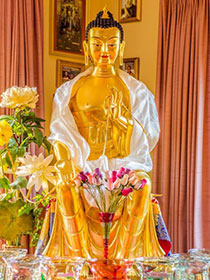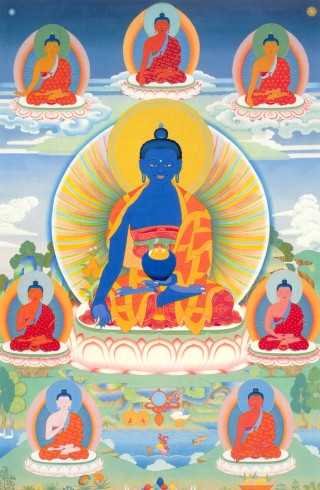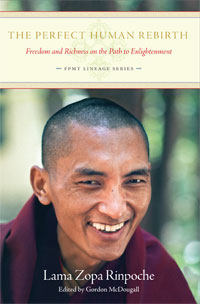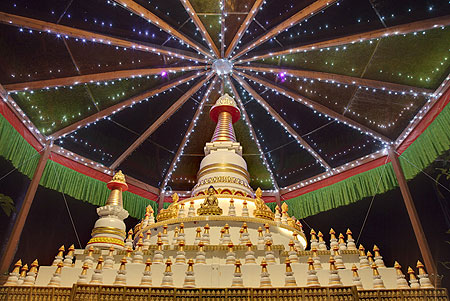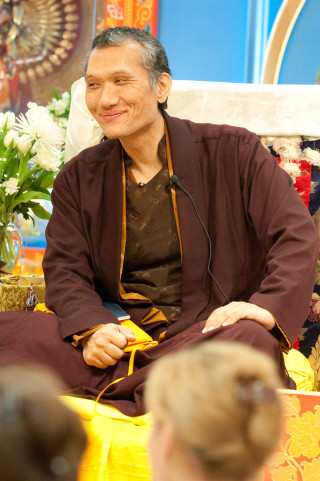- Home
- FPMT Homepage
Foundation for the Preservation of the Mahayana Tradition
The FPMT is an organization devoted to preserving and spreading Mahayana Buddhism worldwide by creating opportunities to listen, reflect, meditate, practice and actualize the unmistaken teachings of the Buddha and based on that experience spreading the Dharma to sentient beings. We provide integrated education through which people’s minds and hearts can be transformed into their highest potential for the benefit of others, inspired by an attitude of universal responsibility and service. We are committed to creating harmonious environments and helping all beings develop their full potential of infinite wisdom and compassion. Our organization is based on the Buddhist tradition of Lama Tsongkhapa of Tibet as taught to us by our founders Lama Thubten Yeshe and Lama Thubten Zopa Rinpoche.
- Willkommen
Die Stiftung zur Erhaltung der Mahayana Tradition (FPMT) ist eine Organisation, die sich weltweit für die Erhaltung und Verbreitung des Mahayana-Buddhismus einsetzt, indem sie Möglichkeiten schafft, den makellosen Lehren des Buddha zuzuhören, über sie zur reflektieren und zu meditieren und auf der Grundlage dieser Erfahrung das Dharma unter den Lebewesen zu verbreiten.
Wir bieten integrierte Schulungswege an, durch denen der Geist und das Herz der Menschen in ihr höchstes Potential verwandelt werden zum Wohl der anderen – inspiriert durch eine Haltung der universellen Verantwortung und dem Wunsch zu dienen. Wir haben uns verpflichtet, harmonische Umgebungen zu schaffen und allen Wesen zu helfen, ihr volles Potenzial unendlicher Weisheit und grenzenlosen Mitgefühls zu verwirklichen.
Unsere Organisation basiert auf der buddhistischen Tradition von Lama Tsongkhapa von Tibet, so wie sie uns von unseren Gründern Lama Thubten Yeshe und Lama Thubten Zopa Rinpoche gelehrt wird.
- Bienvenidos
La Fundación para la preservación de la tradición Mahayana (FPMT) es una organización que se dedica a preservar y difundir el budismo Mahayana en todo el mundo, creando oportunidades para escuchar, reflexionar, meditar, practicar y actualizar las enseñanzas inconfundibles de Buda y en base a esa experiencia difundir el Dharma a los seres.
Proporcionamos una educación integrada a través de la cual las mentes y los corazones de las personas se pueden transformar en su mayor potencial para el beneficio de los demás, inspirados por una actitud de responsabilidad y servicio universales. Estamos comprometidos a crear ambientes armoniosos y ayudar a todos los seres a desarrollar todo su potencial de infinita sabiduría y compasión.
Nuestra organización se basa en la tradición budista de Lama Tsongkhapa del Tíbet como nos lo enseñaron nuestros fundadores Lama Thubten Yeshe y Lama Zopa Rinpoche.
A continuación puede ver una lista de los centros y sus páginas web en su lengua preferida.
- Bienvenue
L’organisation de la FPMT a pour vocation la préservation et la diffusion du bouddhisme du mahayana dans le monde entier. Elle offre l’opportunité d’écouter, de réfléchir, de méditer, de pratiquer et de réaliser les enseignements excellents du Bouddha, pour ensuite transmettre le Dharma à tous les êtres. Nous proposons une formation intégrée grâce à laquelle le cœur et l’esprit de chacun peuvent accomplir leur potentiel le plus élevé pour le bien d’autrui, inspirés par le sens du service et une responsabilité universelle. Nous nous engageons à créer un environnement harmonieux et à aider tous les êtres à épanouir leur potentiel illimité de compassion et de sagesse. Notre organisation s’appuie sur la tradition guéloukpa de Lama Tsongkhapa du Tibet, telle qu’elle a été enseignée par nos fondateurs Lama Thoubtèn Yéshé et Lama Zopa Rinpoché.
Visitez le site de notre Editions Mahayana pour les traductions, conseils et nouvelles du Bureau international en français.
Voici une liste de centres et de leurs sites dans votre langue préférée
- Benvenuto
L’FPMT è un organizzazione il cui scopo è preservare e diffondere il Buddhismo Mahayana nel mondo, creando occasioni di ascolto, riflessione, meditazione e pratica dei perfetti insegnamenti del Buddha, al fine di attualizzare e diffondere il Dharma fra tutti gli esseri senzienti.
Offriamo un’educazione integrata, che può trasformare la mente e i cuori delle persone nel loro massimo potenziale, per il beneficio di tutti gli esseri, ispirati da un’attitudine di responsabilità universale e di servizio.
Il nostro obiettivo è quello di creare contesti armoniosi e aiutare tutti gli esseri a sviluppare in modo completo le proprie potenzialità di infinita saggezza e compassione.
La nostra organizzazione si basa sulla tradizione buddhista di Lama Tsongkhapa del Tibet, così come ci è stata insegnata dai nostri fondatori Lama Thubten Yeshe e Lama Zopa Rinpoche.
Di seguito potete trovare un elenco dei centri e dei loro siti nella lingua da voi prescelta.
- 欢迎 / 歡迎
简体中文
“护持大乘法脉基金会”( 英文简称:FPMT。全名:Foundation for the Preservation of the Mahayana Tradition) 是一个致力于护持和弘扬大乘佛法的国际佛教组织。我们提供听闻,思维,禅修,修行和实证佛陀无误教法的机会,以便让一切众生都能够享受佛法的指引和滋润。
我们全力创造和谐融洽的环境, 为人们提供解行并重的完整佛法教育,以便启发内在的环宇悲心及责任心,并开发内心所蕴藏的巨大潜能 — 无限的智慧与悲心 — 以便利益和服务一切有情。
FPMT的创办人是图腾耶喜喇嘛和喇嘛梭巴仁波切。我们所修习的是由两位上师所教导的,西藏喀巴大师的佛法传承。
繁體中文
護持大乘法脈基金會”( 英文簡稱:FPMT。全名:Found
ation for the Preservation of the Mahayana Tradition ) 是一個致力於護持和弘揚大乘佛法的國際佛教組織。我們提供聽聞, 思維,禪修,修行和實證佛陀無誤教法的機會,以便讓一切眾生都能 夠享受佛法的指引和滋潤。 我們全力創造和諧融洽的環境,
為人們提供解行並重的完整佛法教育,以便啟發內在的環宇悲心及責 任心,並開發內心所蘊藏的巨大潛能 — 無限的智慧與悲心 – – 以便利益和服務一切有情。 FPMT的創辦人是圖騰耶喜喇嘛和喇嘛梭巴仁波切。
我們所修習的是由兩位上師所教導的,西藏喀巴大師的佛法傳承。 察看道场信息:
- FPMT Homepage
- News/Media
-
- Study & Practice
-
-
- About FPMT Education Services
- Latest News
- Programs
- New to Buddhism?
- Buddhist Mind Science: Activating Your Potential
- Heart Advice for Death and Dying
- Discovering Buddhism
- Living in the Path
- Exploring Buddhism
- FPMT Basic Program
- FPMT Masters Program
- FPMT In-Depth Meditation Training
- Maitripa College
- Lotsawa Rinchen Zangpo Translator Program
- Universal Education for Compassion & Wisdom
- Online Learning Center
-
- Prayers & Practice Materials
- Overview of Prayers & Practices
- Full Catalogue of Prayers & Practice Materials
- Explore Popular Topics
- Benefiting Animals
- Chenrezig Resources
- Death & Dying Resources
- Lama Chopa (Guru Puja)
- Lama Zopa Rinpoche: Compendium of Precious Instructions
- Lama Zopa Rinpoche: Life Practice Advice
- Lama Zopa Rinpoche Practice Series
- Lamrim Resources
- Mantras
- Prayer Book Updates
- Purification Practices
- Sutras
- Thought Transformation (Lojong)
- Audio Materials
- Dharma Dates - Tibetan Calendar
- Translation Services
- Publishing Services
- Ways to Offer Support
- Prayers & Practice Materials
-
- Teachings and Advice
- Find Teachings and Advice
- Lama Zopa Rinpoche Advice Page
- Lama Zopa Rinpoche: Compendium of Precious Instructions
- Lama Zopa Rinpoche Video Teachings
- ༧སྐྱབས་རྗེ་བཟོད་པ་རིན་པོ་ཆེ་མཆོག་ནས་སྩལ་བའི་བཀའ་སློབ་བརྙན་འཕྲིན།
- Podcasts
- Lama Yeshe Wisdom Archive
- Buddhism FAQ
- Dharma for Young People
- Resources on Holy Objects
- Teachings and Advice
-
-
*If a menu item has a submenu clicking once will expand the menu clicking twice will open the page.
-
-
- Centers
-
- Teachers
-
- Projects
-
-
-
-
*If a menu item has a submenu clicking once will expand the menu clicking twice will open the page.
-
-
- FPMT
-
-
-
-
-
When we are able to recognize and forgive ignorant actions done in one’s past, we strengthen ourselves and can solve the problems of the present constructively.
His Holiness the Dalai Lama
-
-
-
- Shop
-
-
-
The Foundation Store is FPMT’s online shop and features a vast selection of Buddhist study and practice materials written or recommended by our lineage gurus. These items include homestudy programs, prayers and practices in PDF or eBook format, materials for children, and other resources to support practitioners.
Items displayed in the shop are made available for Dharma practice and educational purposes, and never for the purpose of profiting from their sale. Please read FPMT Foundation Store Policy Regarding Dharma Items for more information.
-
-
Study & Practice News
15
Compiled from various teachings by Lama Zopa Rinpoche, Benefits of Medicine Buddha Mantra and Practice details the many blessings associated with engaging in Medicine Buddha practice.
FPMT Education Services is happy to freely offer this compilation.
The Medicine Buddha encompasses all the buddhas. This means that when we practice the seven-limb prayer and make offerings with the seven limbs, we receive the same merit as we would if we had made offerings to all the buddhas. Similarly, when we recite the mantra of Medicine Buddha, we collect unbelievable merit just as when we offer the seven-limb practice to Medicine Buddha.
—Lama Zopa Rinpoche
- Tagged: fpmt education services, medicine buddha
8
The Perfect Human Rebirth By Lama Zopa Rinpoche
The FPMT Lineage series is comprised of books of Lama Zopa Rinpoche’s teachings on the graduated path to enlightenment (lam-rim) drawn from his four decades of discourses on the topic based on his own textbook, The Wish-fulfilling Golden Sun, and several traditional lam-rim texts. The books in general are arranged according to the outline of Pabongka Rinpoche’s Liberation in the Palm of Your Hand.
The first in this series is Heart of the Path and the second is How to Practice Dharma: Teachings on the Eight Worldly Dharmas. The Lama Yeshe Wisdom Archive is now actively working on the next book in the series, Rinpoche’s teachings on impermanence and death.
- Tagged: lam-rim
23
Basic Program News from FPMT Education Services
Basic Program Guidelines 2013: The new, entirely revised edition, is now available online!
The new edition of the updated and revised Basic Program Guidelines for Implementation is now available online.
The Basic Program Guidelines 2013 web page (members area login required) presents the document in separate parts with contents listed, to make it easy to find and access the specific advice you need for your Basic Program. Please explore!
PLEASE NOTE: The Basic Program CD is no longer in use, and the old edition BPGuidelines2006 that was included on the CD should no longer be used. The Basic Program materials pages (in English, French and Spanish) are accessible for Basic Program implementing centers and teachers from the FPMT Affiliates Area.
Basic Program in English to start in Australia
Western teacher Jampa Jaffe will teach the second Basic Program at Vajrayana Institute, Ashfield, NSW, Australia, starting February 2014. Jampa was the teaching assistant for the first FPMT Masters Program at Istituto Lama Tzong Khapa, Italy.
12
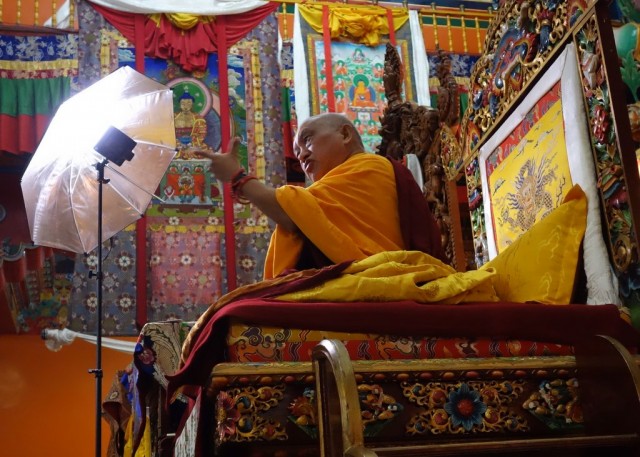
Lama Zopa Rinpoche teaching at Kopan Monastery on how important it is to serve others, Nepal, December 1, 2013. Photo by Ven.Roger Kunsang.
“… When you abandon harm to others, you receive so much happiness from others, from life to life, for 100 lifetimes,” Lama Zopa Rinpoche advised. “Just by abstaining from harm to others one time you receive benefit for 100 lifetimes. By practicing the morality of not stealing, you receive wealth for 100 lifetimes. By practicing charity one time, you will enjoy good results in hundreds and thousands of lifetimes. In the Arya Sanghatasutra it is said that by practicing generosity once to a sentient being you will gain enjoyment for 80 or 80,000 eons. With a good heart, if you benefit somebody, you will receive enjoyment for 100 lifetimes, since karma is expandable. From one virtue, you experience the result for so many lifetimes or for so many times in one life.
“Firstly, you should think that sentient beings are wish-fulfilling jewels. Secondly, you should be the wish-fulfilling jewel to other sentient beings in daily life. This is very important. Even if you are not working or you are in a cave, not seeing anybody, not even an insect, you should editate on bodhicitta. You should think how precious sentient beings are. And think, “I must do the same.” This is an excellent way to live life, especially living a busy life with others. By living life with this attitude, it is the happiest life and most meaningful life. There will be nothing to be scared of in the future. Life is like sunshine in the future.
“I presented the above in relation to Dharma and Buddhism – how others will feel if you are a wish-fulfilling jewel to others. If you become a wish-fulfilling jewel to others, as a result, others will become a wish-fulfilling jewel to you. This can be explained on this basis. …”
— Excerpted from “Attitude for Offering Service,” a letter written by Lama Zopa Rinpoche, April 2008
Lama Zopa Rinpoche is the spiritual director of the Foundation for the Preservation of Mahayana Tradition (FPMT), an organization dedicated to preserving Mahayana Buddhism through offering the Buddha’s authentic teachings and to facilitating reflection, meditation, practice and the opportunity to actualize and directly experience the Buddha’s teachings. Sign up to receive news and updates.
- Tagged: lama zopa rinpoche, mandala, service
- 0
4
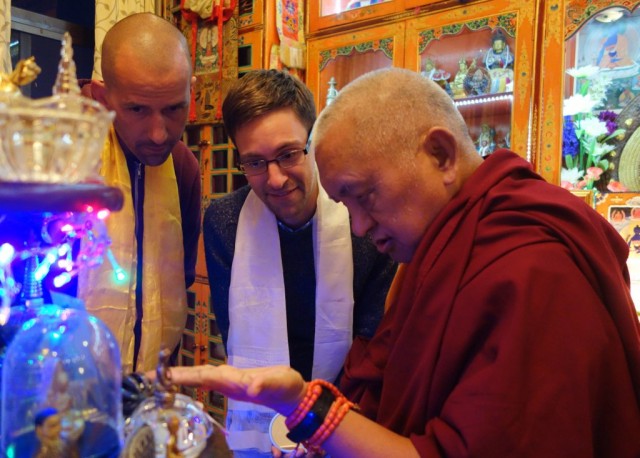
Lama Zopa Rinpoche pointing out the dorje of Padmasambhava to Tom Truty and friend, Kopan Monastery, Nepal, November 29, 2013. Photo by Ven. Roger Kunsang.
FPMT spiritual director Lama Zopa Rinpoche returned to Kopan Monastery on November 22. Since arriving, Rinpoche has offered teachings to students attending the month-long November course on lam-rim, circumambulated at Swayambhunath and received many visitors among other activities. FPMT Education Services director Tom Truty visited Rinpoche in late November. This is a particularly fruitful time for FPMT Education Services as Merry Colony, former director and who continues to work for the department, is also at Kopan, affording them all the opportunity to connect and discuss FPMT Education’s past and future.
FPMT Education Services materials are all produced under the guidance of Rinpoche. This includes practice books, education programs like Discovering Buddhism and Living in the Path, translations of important texts and much more.
Lama Zopa Rinpoche is the spiritual director of the Foundation for the Preservation of Mahayana Tradition (FPMT), an organization dedicated to preserving Mahayana Buddhism through offering the Buddha’s authentic teachings and to facilitating reflection, meditation, practice and the opportunity to actualize and directly experience the Buddha’s teachings. Sign up to receive news and updates.
- Tagged: fpmt education services, lama zopa rinpoche, tom truty
- 0
2
Instruction on Offerings to Stupas
Lama Zopa Rinpoche translated Padmasambhava’s Instruction on Offerings to Stupas, which details the benefits of prostrating to, making offering, circumambulating , and offering service to stupas.
Translations Available:
One of Lama Zopa Rinpoche’s Vast Visions for FPMT is to build 100,000 stupas around the world. The Stupa Fund was established in 1992 with the aim of providing the resources needed to fulfill Rinpoche’s wishes.
If you would like to contribute to the Stupa Fund, you may donate any amount.
All those who with virtue help the stupa will, in all lives, enter into the perfect path of the ten virtues, never be separated from the support of virtuous friends, and achieve all the realizations they wish.
—- From Padmasambhava’s Instruction on Offerings to Stupas
- Tagged: stupa fund
1
2014 Liberation Calendar
As 2013 enters its final months, the time is arriving to begin planning for 2014.
Since 1999, the Liberation Prison Project has produced the Liberation Calendar, a Tibetan lunar calendar which includes dates and information about more than thirty kinds of practice days and auspicious and inauspicious days for each month.
The calendar is prepared by astrologer Ngawang Thartho based on the Tibetan Medical and Astrological Institutes calendar, with additional advice from Lama Zopa Rinpoche, Spiritual Director of FPMT, and Geshe Ngawang Dakpa, astrologer lama of FPMT’s Tse Chen Ling in San Francisco.
27
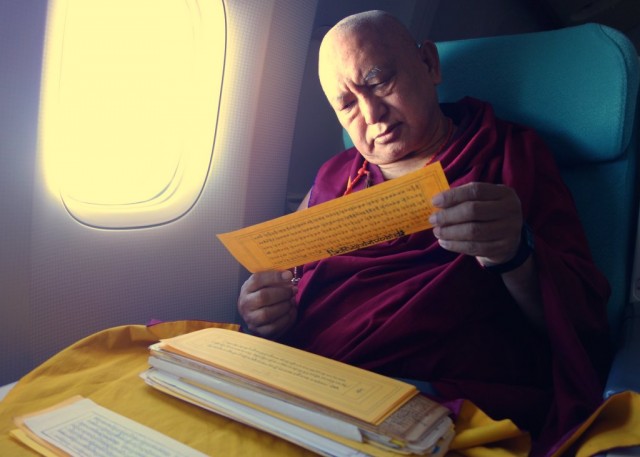
Lama Zopa Rinpoche reads texts and meditates while flying, November 22, 2013. Photo by Ven. Roger Kunsang.
A pilot once asked to have his photo taken with Lama Zopa Rinpoche. “I began to think about what [the pilot] could do for safety as he flies the plane, not only for his own safety but for the safety of the hundreds of passengers on the plane,” Rinpoche said. “I told the pilot that if you carry Buddha’s relics when you travel it has the power to stop any inauspicious thing that could cause danger and difficulties (such as it being the wrong astrological date, at the wrong time, etc.).
“I also suggested he carry the Diamond Cutter Sutra – it offers great protection. This sutra is the heart teaching of the 84,000 teachings of the Buddha, and is about realizing the perfection of wisdom, the teachings on emptiness. This realization is what liberates sentient beings from all the causes of samsara, which are delusion and karma, and even the subtle defilements. By eliminating these you can enlighten so many beings and liberate them from all the sufferings of samsara. All of this comes from this sutra, which teaches the path of wisdom realizing emptiness. So, it is a great blessing and protection to have this text on an airplane. …”
From “Advice for Flying,” posted on Lama Yeshe Wisdom Archive, November 2005.
More information, photos and updates about FPMT spiritual director Lama Zopa Rinpoche can be found on Rinpoche’s homepage. If you’d like to receive news of Lama Zopa Rinpoche via email, sign up to Lama Zopa Rinpoche News.
- Tagged: flying, lama zopa rinpoche, mandala, vajra cutter sutra
- 0
21
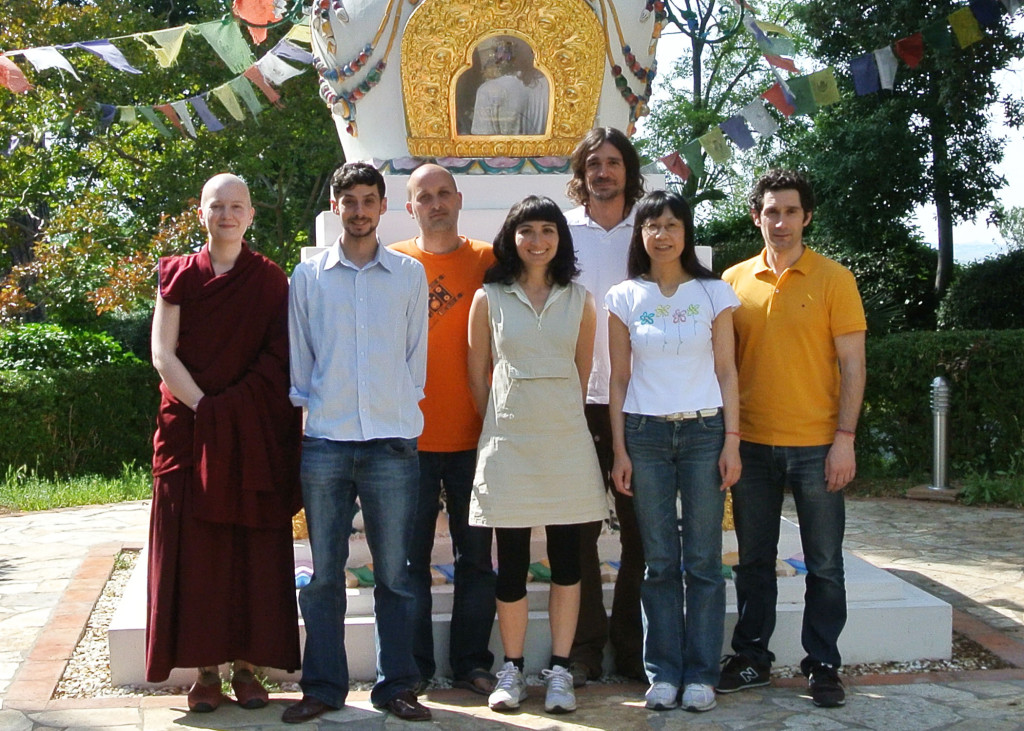
Masters Program students (left to right): Ven. Tiziana Losa, Jacob Fisher, Yaniv Sagi, Marina Brucet, Hans Burghardt, Yumi Terada and Joan Dombón, Istituto Lama Tzong Khapa, Pomaia, Italy, July 2013. Photo courtesy of ILTK.
The 2008-2013 class of the FPMT Masters Program have “just completed their final exams with the intention to enter retreat in 2014,” Olga Planken, Basic Program and Masters Program coordinator for FPMT Education Services, reported to Mandala this week.
Mandala recently featured an interview with five students from the 2008-2013 cohort before their exams had taken place, answering questions about the challenges and benefits of completing the extensive program and what they were looking forward to in the future:
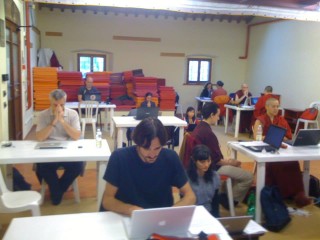
Students from the 2008-2013 FPMT Masters Program cohort sit for their final exams, 2013. Photo courtesy of www.facebook.com/mpretreat.
What do you hope to gain from the culminating one-year retreat?
Marina: I really hope to be able to integrate some of the things we’ve learned during the Masters Program into myself, to gain deeper understanding of the Dharma and of myself, and to set the basis to stabilize and start transforming my mind at a deeper level, a task that I hope will not only be done during the retreat but will continue for the rest of my life. As I see it, it’s the only way to effectively be of benefit to others.
Yumi: I hope to be able to develop some inner qualities that can be really used to help others.
Ven. Tiziana: I feel the need now to have more time to reflect on what I have been studying. Reflection and meditation are essential to gain experience of what we have learned. I am feeling very fortunate to have this rare opportunity.
Jacob: The opportunity to really be in a perfect environment for meditation, and the chance to try and really become this Dharma that we’ve been studying.
Hans: The integration at a deeper level of some of the subjects we’ve studied, and an increased wish to do long retreats.
Masters Program students are now making preparations for their one-year retreat. As part of the preparations, seven of the students have created a fundraising campaign to make it possible for them to be supported during their retreat. So far they have raised €37,800 (US$50,800).
After Masters Program students successfully complete their retreat, they graduate from the program and are then eligible to apply to become FPMT registered teachers. As reported in “The Need for Qualified Teachers” (Mandala April-June 2013), FPMT registered teachers serve as much-needed instructors at FPMT centers around the world, offering authentic Dharma instruction and helping fulfill the wishes of Lama Zopa Rinpoche for education within FPMT. Several resident teachers in FPMT centers today were trained in the FPMT Masters Program’s first cohort, including Don Handrick, Thubten Norbu Ling, US; Sixte Vinçotte, Institut Vajra Yogini, France; Emily Hsu, Gyalwa Gyatso Buddhist Center, US; and Wai Cheong Kok, Vajrayana Institute, Australia.
Masters Program graduates also serve in various other roles to support FPMT education programs, such as teaching assistants, tutors, and coordinators for Masters and Basic Programs, both residential and online, and several teach Discovering Buddhism.
To learn more about the fundraising campaign to finance Masters Program students on their one-year retreats, visit their webpage: Support the rEvolution. You can also connect with the students on their Facebook page.
Mandala brings you news of Lama Zopa Rinpoche and of activities, teachings and events from over 160 FPMT centers, projects and services around the globe. If you like what you read on Mandala, consider becoming a Friend of FPMT, which supports our work.
- Tagged: istituto lama tzong khapa, mandala, masters program
- 0
Founder and president of Maitripa College Yangsi Rinpoche talks about the development of mindfulness in the August-September 2007 issue of Mandala:
In order to have a faultless practice of calm abiding, we need to develop very strong concentration supported by very strong mindfulness and wisdom. Wisdom in this case refers to the function of mind called introspection, which acts as a kind of security guard for the mind – watching for faults or weaknesses that may arise in our concentration. We should train in the mindfulness possessing three qualities. Our mindfulness must be able to remember the aspect of our object of concentration. It must have the ability to hold that aspect, and it must not be distracted by other objects.
You should seek to develop a concentration that is stable and lasting. In order to be able to bring this about, mindfulness is very important. Of course, even in terms of our ordinary perception, every primary mind is accompanied by five determining factors, one of which is mindfulness. …
From Mandala August-September 2007
18
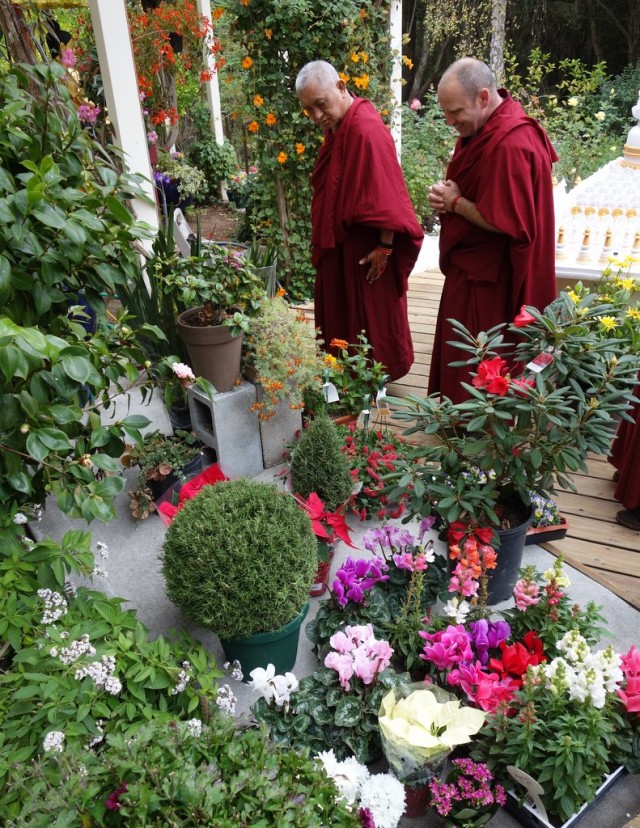
Lama Zopa Rinpoche after a trip to the local garden shop directing where the flowers go and creating beautiful offerings to all the gurus, buddhas and bodhisattvas and holy beings! Kachoe Dechen Ling, Aptos, California, November 17, 2013. Photo by Ven. Roger Kunsang.
[When] you go shopping, watch your motivation, prepare your motivation. When you are in the shop either fulfill the wishes of the guru or shop to benefit and serve other sentient beings. Think that the ultimate purpose is to fulfill the guru’s advice. So you buy these things to survive and to fulfill the wishes of the guru or benefit sentient beings. In this way shopping becomes the antidote to attachment, becomes virtuous activity, Dharma, and you collect extensive merit.
– Lama Zopa Rinpoche, from the advice “Making Ordinary Life Actions Meaningful,” 2007
More advice can be found on the page “Advice from Lama Zopa Rinpoche.”
Learn more about Lama Zopa Rinpoche, spiritual director of the Foundation for the Preservation of Mahayana Tradition (FPMT), and Rinpoche’s vision for a better world. Sign up to receive news and updates.
- Tagged: daily living, mandala
- 0
14
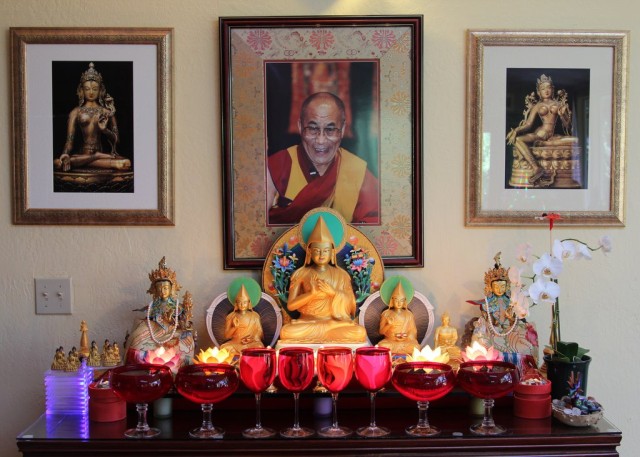
One of the altars at Kachoe Dechen Ling, Aptos, California, November 2013. Photo by Ven. Roger Kunsang.
“… All the suffering of samsara comes from the mind. Happiness, liberation and enlightenment come from the mind. Suffering comes from the unsubdued mind. Liberation and enlightenment come from the subdued mind, therefore, subduing the mind is essential. So what Buddha said is just an example, manifesting numberless forms naturally without effort – as impure forms to sentient beings who have an impure mind, and as pure forms to sentient beings with a pure mind,” Lama Zopa Rinpoche wrote to a new student in a letter recently posted to Lama Yeshe Wisdom Archive’s “Lama Zopa Rinpoche Online Advice Book.”
The letter continues:
“In Buddhism, especially in Mahayana Buddhism, guru devotion is the root of the path to enlightenment. The Buddha’s 84,000 teachings have three levels. There are the Hinayana (Lesser Vehicle) teachings for the lower capable being. For those with greater intelligence and capacity, Buddha revealed the Mahayana Paramitayana teachings. Then for those with higher intelligence, merit or capacity, Buddha taught Mahayana Secret Mantra – Vajrayana.
“In Hinayana, we don’t look at the guru as a buddha, but we respect the guru as if he is a buddha and we obey the guru, the abbot who grants ordination and gives teachings. In Mahayana Paramitayana, we look at the guru as a buddha, having no mistakes but only qualities. In tantra, on that basis – seeing the guru as a buddha – we look at the guru in the pure form of a buddha, we look at the essence as a buddha.
“Obedience is most important, otherwise we cannot achieve realizations; we cannot achieve enlightenment. …”
You can read the entire letter on the Lama Yeshe Wisdom Archive website.
Lama Zopa Rinpoche is the spiritual director of the Foundation for the Preservation of Mahayana Tradition (FPMT), an organization dedicated to preserving Mahayana Buddhism through offering the Buddha’s authentic teachings and to facilitating reflection, meditation, practice and the opportunity to actualize and directly experience the Buddha’s teachings. Sign up to receive news and updates.
- Tagged: guru devotion, lama zopa rinpoche, mandala
- 0
- Home
- News/Media
- Study & Practice
- About FPMT Education Services
- Latest News
- Programs
- New to Buddhism?
- Buddhist Mind Science: Activating Your Potential
- Heart Advice for Death and Dying
- Discovering Buddhism
- Living in the Path
- Exploring Buddhism
- FPMT Basic Program
- FPMT Masters Program
- FPMT In-Depth Meditation Training
- Maitripa College
- Lotsawa Rinchen Zangpo Translator Program
- Universal Education for Compassion & Wisdom
- Online Learning Center
- Prayers & Practice Materials
- Overview of Prayers & Practices
- Full Catalogue of Prayers & Practice Materials
- Explore Popular Topics
- Benefiting Animals
- Chenrezig Resources
- Death & Dying Resources
- Lama Chopa (Guru Puja)
- Lama Zopa Rinpoche: Compendium of Precious Instructions
- Lama Zopa Rinpoche: Life Practice Advice
- Lama Zopa Rinpoche Practice Series
- Lamrim Resources
- Mantras
- Prayer Book Updates
- Purification Practices
- Sutras
- Thought Transformation (Lojong)
- Audio Materials
- Dharma Dates – Tibetan Calendar
- Translation Services
- Publishing Services
- Teachings and Advice
- Find Teachings and Advice
- Lama Zopa Rinpoche Advice Page
- Lama Zopa Rinpoche: Compendium of Precious Instructions
- Lama Zopa Rinpoche Video Teachings
- ༧སྐྱབས་རྗེ་བཟོད་པ་རིན་པོ་ཆེ་མཆོག་ནས་སྩལ་བའི་བཀའ་སློབ་བརྙན་འཕྲིན།
- Podcasts
- Lama Yeshe Wisdom Archive
- Buddhism FAQ
- Dharma for Young People
- Resources on Holy Objects
- Ways to Offer Support
- Centers
- Affiliates Area
- Teachers
- Projects
- Charitable Projects
- Make a Donation
- Applying for Grants
- News about Projects
- Other Projects within FPMT
- Support International Office
- Projects Photo Galleries
- Give Where Most Needed
- FPMT
- Shop
Translate*
*powered by Google TranslateTranslation of pages on fpmt.org is performed by Google Translate, a third party service which FPMT has no control over. The service provides automated computer translations that are only an approximation of the websites' original content. The translations should not be considered exact and only used as a rough guide.Cherishing others is the source of all happiness.







